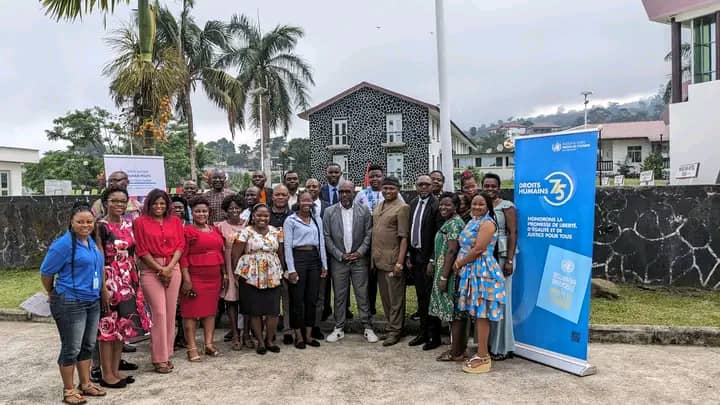OHCHR Central Africa Regional Office, Educational Stakeholders, and Youths-led organisations have discussed various ways in which the right to education can be improved.
The discussions surrounding the right to education were held at the Buea Mountain Hotel on April 17 and 18 as part of the commemoration of the 75th anniversary of the Universal Declaration of Human Rights.
The two-day event saw the UN Human Rights Office hold separate discussions with educational stakeholders and youth leaders in the Southwest region.
The Universal Declaration of Human Rights clocked 75 last year, and as such, UN Human Rights had to align the anniversary with its spotlight team, which is also part of the world’s human rights education, and the quarter for human rights education that ends in 2024.
According to Kiven Fonyuy, Human Rights Officer at OHCHR Central Africa Regional Office, youths are a focus of this quarter of action, which means the OHCHR Central Africa Regional Office needs to see how youths are advancing their rights to education and promoting human rights in their communities.
“So, we organised a symposium with educational stakeholders in the Southwest region to discuss access to education in this region. And we have also today (April 18) had youths led organisations to discuss their role in promoting the rights to education and access to education and all that goes with it,” he said.
Kiven said the discussions were hectic and thought-provoking among the participants on the measures taken to improve the right to education.
Some of the measures include erecting fences around school milieus, and sensitising community leaders on the need to protect those schools and also teachers. The need to also sensitise actors on human rights education, and turn schools into tertiary practical-based schools.
The UN Human Rights Office and the stakeholders are discussing this at a time when education is under attack in Cameroon’s English-speaking regions and the Far North Region. For instance, some schools in English Cameroon have not resumed to date following the shutdown of school activities in 2016 and later an escalation of the conflict in 2017. Pupils and students have been killed; some were constrained at home, while others were kidnapped. These constitute a violation of their right to education.
“The fact is, and the fact has to remain, that youths need to have access to quality education. Children need to have access to education. The right to education is non-negotiable. Without education, your life does not have much meaning. That is why we are hammering on the rights to education, access to education, and quality education,” said Kiven Fonyuy.
According to him, the discussion hammering on ways to improve access to education was timely.
“We have been really happy. I am proud of the exchanges and the recommendations that have been able to come out of these reflections.
At the various sessions, the various stakeholders gave testimonies of the challenges they have been facing in ensuring that children are educated. Now, they have been drilled on ways to overcome those challenges.
Elisabeth Mende is a teacher at Government School Likoko Mimbia who took part in the symposium on the right to education. She said the challenges to education are enormous, especially coupled with the Anglophone crisis, and now they are trying to help the children whose education has been affected, to bounce back.
She said they were told in the session to turn the school to be more tertiary so that even if the child ends at a certain level, they can sit and do something for themselves.
“With what we have been doing, we have come to learn more. Likoko Mimbia is a complex environment in the sense that the school is just by the roadside and that it is not fenced. So intruders getting into the schools are very common. So I have learned that we can get vigilantes, or even our parents, to check who comes into the school and goes out,” she said.
Meanwhile, for Nji Lucas of Recover and Rehabilitate for a Better Tomorrow (REREHABET), it was important for them as members of the civil society to take action in coming together to make the society better.
“To curb challenges to education is simple. People who violate these rights in most cases are not persons without responsibilities. We are talking about quality education, and in most cases, when education subsidies are made available, we still have some scrupulous members working with the government that do not want some of these subsidies to go through,” he said.
As they left the Buea Mountain Hotel, the UN Human Rights said it expects participants to drive the message across that education is a human right and that without education, there are limits to what they can achieve.
“The challenges we have had from seven years of school blockage and shutdown in some areas of the region are going to be there and are going to affect these regions for the next 50 years. It is obvious. One year of a child not schooling affects the life of that child for several years. No matter whatever issues come up, you need to encourage children to go to school,” said Kiven Fonyuy.
By Njodzeka Danhatu
